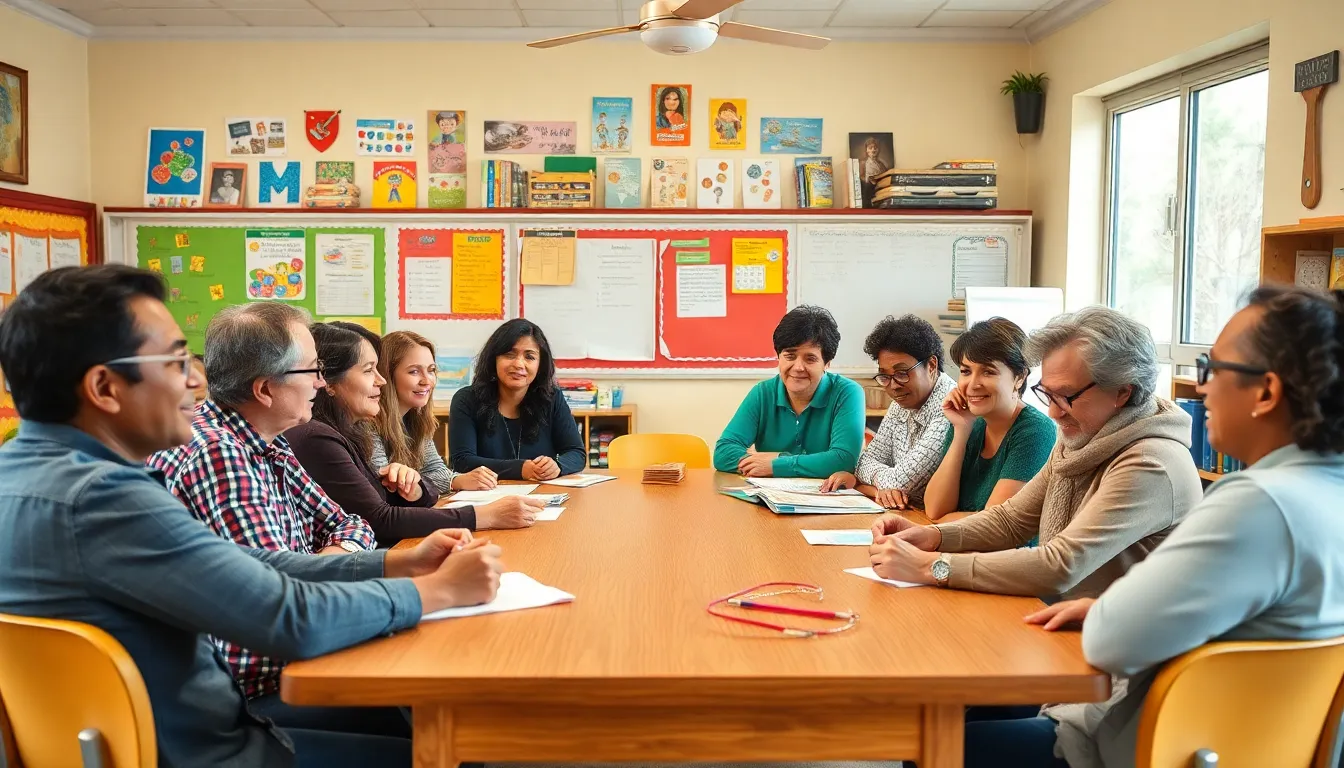Table of Contents
ToggleWhen it comes to school, parents often find themselves navigating a maze of meetings, bake sales, and the occasional awkward small talk. Enter the school parent committee, the secret society of enthusiastic moms and dads who wield the power to shape their children’s educational experience. If you think it’s just a bunch of folks sipping coffee and nodding politely, think again! These committees are where ideas flourish, friendships blossom, and yes, even the occasional snack bar gets upgraded.
Imagine a place where parents unite to tackle everything from fundraising to organizing events, all while sharing a laugh or two. School parent committees aren’t just about making decisions; they’re about building a community. So, whether you’re a seasoned pro or a newbie, joining one of these committees could be your ticket to making a real difference—and maybe even discovering your hidden talent for event planning (or at least your knack for bringing the best cookies).
Overview of School Parent Committees
School parent committees serve as essential platforms for parental involvement in education. These groups foster collaboration among parents, faculty, and school administration. Collaborative efforts contribute to improved educational experiences for students.
Parent committees typically engage in various activities that benefit their school communities. Fundraising initiatives raise money for school supplies, field trips, and extracurricular activities. Events such as book fairs, family nights, and seasonal celebrations create community spirit and bring families together.
Active participation offers numerous advantages for parents. They build relationships with other families and develop a sense of belonging within the school. Members often discover hidden skills, such as event planning, communication, or leadership. Each skill enhances their contributions to the committee and the school environment.
Communication is a cornerstone of parent committees. Regular meetings ensure all members remain informed about upcoming events and school needs. Newsletters, social media updates, and community bulletins facilitate discussions and promote engagement.
Diverse perspectives enrich committee activities. Parents from various backgrounds share insights that help shape decisions and initiatives. Their unique experiences create well-rounded solutions that address the needs of the entire school community.
Encouraging participation in school parent committees promotes an inclusive atmosphere. Schools benefit from the diverse skills and experiences parents bring. Together, they create a supportive environment that enhances student achievement and strengthens community ties.
Importance of School Parent Committees

School parent committees play a crucial role in enhancing the educational landscape for children. Through collaboration, these committees empower parents, creating a supportive environment for community involvement.
Enhancing Parent Engagement
Active participation in committees boosts parent engagement significantly. Parents can share ideas, volunteer for activities, and contribute to decision-making processes. Engaged parents often report increased satisfaction with their child’s educational experience. Providing a platform for parental input strengthens community ties and deepens the commitment to school initiatives. Involvement encourages parents to become advocates for their children, fostering a culture of support and collaboration.
Fostering Communication Between Parents and Schools
Effective communication between parents and schools serves as a foundation for successful educational experiences. Committees facilitate open dialogue, allowing parents to voice concerns and share feedback on school programs. Regular meetings and updates ensure that everyone stays informed about school events and initiatives. Strong communication channels promote transparency and understanding, bridging gaps between families and school staff. Engaged discussions lead to collaborative problem-solving, enhancing the overall school environment.
Functions of School Parent Committees
School parent committees play a crucial role in enhancing educational experiences through various functions. They uphold community engagement, support school initiatives, and provide essential resources.
Organizing Events and Activities
Organizing events and activities forms a core function of school parent committees. These committees create opportunities for parents and students to interact, such as book fairs, family nights, and theme days. Each event strengthens community ties while elevating school spirit. Parents come together to plan logistics, coordinate volunteers, and ensure successful experiences. Additionally, fundraising events generate vital resources to support academic programs and extracurricular activities. Overall, these gatherings contribute to memorable experiences that foster a sense of belonging among families.
Supporting School Programs and Initiatives
Supporting school programs and initiatives significantly enhances educational offerings. Committees advocate for initiatives that address specific needs within the school community. They identify opportunities for improvement, such as classroom resources or enrichment programs. By collaborating with faculty and administration, parents share insights that shape effective strategies. Each initiative reflects diverse perspectives and promotes an inclusive environment. Furthermore, active participation helps secure funding and resources needed for various programs, ensuring children receive a well-rounded education that meets their diverse needs.
Benefits of School Parent Committees
School parent committees play a crucial role in enhancing educational experiences and building community connections within schools. They create exceptional opportunities for parents to engage actively.
Building a Stronger School Community
Building a community around schools fosters vital connections among families, educators, and administrators. These committees organize events that encourage collaboration and strengthen relationships, creating a supportive and inclusive environment. Book fairs, family nights, and other activities serve as platforms for parents to bond and create lasting friendships. Diverse perspectives enrich discussions, ensuring all voices are heard. Collective efforts lead to a vibrant school culture where students thrive, families feel valued, and trust between parents and educators flourishes.
Encouraging Student Success
Encouraging student success remains a primary focus of school parent committees. By facilitating parental involvement, these groups enhance educational outcomes and support academic progress. Fundraising initiatives provide necessary resources for academic programs and extracurricular activities, directly benefiting students’ learning environments. Active committee participation allows parents to share insights and strategies that can effectively address challenges. Ultimately, strong communication within these committees establishes a foundation where both parents and educators work collaboratively, ensuring students reach their full potential.
Challenges Faced by School Parent Committees
School parent committees encounter several challenges that can hinder their effectiveness. Addressing these challenges is crucial for fostering an inclusive environment.
Overcoming Participation Barriers
Participation barriers often stem from time constraints and lack of awareness. Busy parents may struggle to find time for meetings or events. Additionally, some parents may not know about the committee’s role or upcoming activities. Clear communication about meeting times and the importance of involvement helps increase engagement. Providing flexible schedules for meetings and offering childcare services creates an inviting atmosphere. Encouraging diverse participation enriches the committee and broadens perspectives.
Navigating Conflicts and Differences
Conflict often arises within committees due to differing opinions and backgrounds. Navigating these differences requires open communication and respect. Establishing clear guidelines for discussions fosters a collaborative environment. Active listening plays an essential role in resolving disputes effectively. When conflicts do occur, focusing on shared goals helps create unity. Promoting an inclusive culture allows diverse viewpoints to coexist, benefiting all committee members. By addressing conflicts constructively, committees enhance their dynamics and contribute positively to the school community.
School parent committees are essential to enriching the educational landscape for students. By fostering collaboration and open communication among parents, faculty, and administration, these committees create a supportive community that enhances student experiences. Engaging in these groups not only allows parents to contribute to school initiatives but also helps them discover and develop new skills.
Ultimately, active participation in school parent committees cultivates a vibrant school culture that benefits everyone involved. This collective effort strengthens community ties and ensures that students receive the resources and support they need to thrive. Embracing this opportunity can lead to lasting positive changes in both the school environment and the lives of students.




